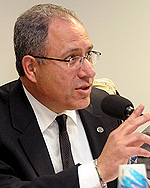
NYSUT's Andy Pallotta
NYSUT joined parents, educators and other union and civic leaders in calling for reforms of the state's charter school law after revealing to a legislative panel evidence of financial mismanagement, conflicts of interest and concerns about student enrollment within the charter school industry.
"NYSUT supports a charter law that encourages a system that serves all students fairly," Executive Vice President Andy Pallotta testified before the Senate Standing Committee on Corporations, Authorities and Commissions on April 22.
"We want to ensure that all schools - charter and district schools - are funded fairly, and that all schools are accountable and transparent in how they spend public tax dollars."
Pallotta was among dozens who testified in a nearly 12-hour, often heated committee hearing about publicly funded, privately operated charter schools.
"For our children to have a bright future, we must shine a light on the operations of charter and public schools alike," said committee chair Sen. Bill Perkins, D-Harlem.
Pallotta told the panel of state lawmakers that NYSUT is not opposed to raising the cap on charter schools, as long as necessary reforms are enacted.
"Charter schools ... have an important place in our system of public education," he said, but because of failures of the current charter law, legitimate questions go unanswered.
"Current charter law fails to reliably protect against financial abuses; it fails to ensure that charters fairly serve children most at risk of failure; and it fails to ensure that teachers in all schools can rely on results to identify best practices that advance student learning," Pallotta said.
Pallotta referenced hundreds of public documents, many obtained by NYSUT through the Freedom of Information Law, that show management conflicts of interest and questionable use of public tax dollars.
For example:
-
A Brooklyn charter school acquired a bridal boutique and paid its director more than $144,000.
-
A Buffalo charter school purchased thousands of dollars worth of big screen TVs that ended up in the homes of employees.
-
In another Buffalo charter school, the board president is part of a real estate partnership that holds a high-interest mortage on the school building.
Data also reveals questionable test comparisons based on charters' underenrollment of the state's neediest students.
For example:
-
7.2 percent of students in charter schools receive special education services, compared to nearly 15 percent in Albany; 17 percent in Buffalo and 20 percent in Syracuse.
-
Just 3.8 percent of New York City's charter population is English language learners, compared to 14 percent in New York City district schools.
The findings are in NYSUT's report, A $2 Billion Decision: The Case for Reforming New York's Charter School Law, being submitted to the committee.
Diane Ravitch, a noted education historian and former champion of charters, said their creation was supposed to help regular public schools. "The original vision of charter schools was that they would help strengthen public schools, not compete with them," Ravitch said.
She reminded the panel of a recent Stanford University study that found only 17 percent of charter schools nationally outperformed regular public schools; 46 percent had learning gains no different from public schools, and 37 percent had gains that were worse than regular public schools.
Calls for transparency and accountability - by charter supporters and opponents - were repeated throughout the hearing.
"All children should have a great education, all schools should be great schools and we need charter reform now," said Mona Davids, founder of the New York Charter School Parent Group.
NYSUT and the United Federation of Teachers, the state union's New York City affiliate which runs its own charter schools, called for legislative reforms in a "Chartering Fairness" package:
-
Financial and operational audits by city and state comptrollers;
-
Ethics reform;
-
A commitment to serve needy students;
-
An end to over-saturation; and fair funding.
"The UFT?remains deeply committed to Albert Shanker's original vision of charter schools as innovative approaches to teaching and learning," UFT?President Michael Mulgrew said.
Ravitch noted that New York City has 50,000 homeless students, "but only about 100 are enrolled in a charter school."
Ed Bradley, president of the South Buffalo Charter School Union, said his school needs to do a better job serving all students.
"Our school has gone from being a community school with a warm atmosphere of teaching all kids to a cold, corporate model that filters low-performing, tardy, and behavioral problem children from the school," Bradley said. "Often our students who face the greatest personal challenges and have the highest needs never get to receive the benefits my school can provide."
Bradley also testified about questionable financial practices by the school's management company. While the company has nearly $5 million in reserves, the school is cutting back on programs and laying off teachers, he said.
Noting that NYSUT represents educators in charter and regular public schools, Pallotta said it is vital for all teachers to know whether a school's success is due to a strong curriculum, excellent professional development or, in some cases, the underenrollment of needy students.
"Those answers will help all of us serve students better," he said.